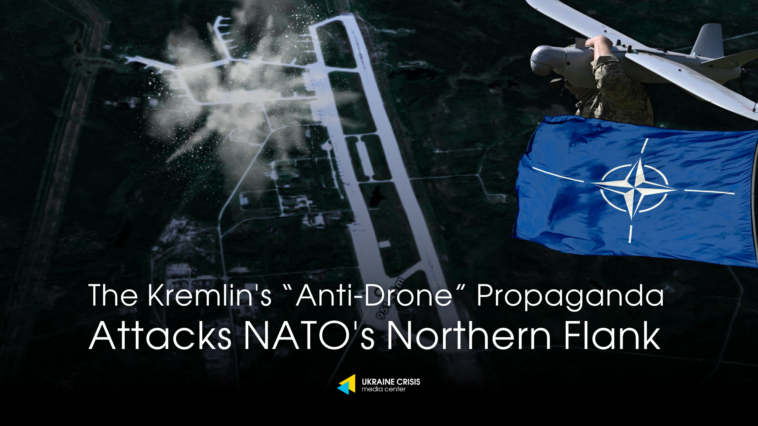Viktoriia Odusanvo, UCMC/HWAG Analyst
On September 11, ‘unidentified drones’ visited the Russian airfield Olenya in the Murmansk region. As a result, Russian strategic aviation aircraft were forced to take to the skies for a while, and airport operations were limited.
Interestingly, this time, Russian propagandists blamed NATO members Norway, Finland, and Sweden rather than Ukraine. Thus, the Mash Telegram channel reported that the drones were launched from the grounds of the Finnish Ivalo airport. A pro-Kremlin network of channels picked up on this information and accused other Scandinavian countries of aggression. According to reports, Norway ‘gave the green light’ for the UAVs to fly, and Sweden, using two radio reconnaissance aircraft, monitored the Russian border on the eve of the operation.
The General Staff of the Finnish Defence Forces stated that the information about UAVs being launched from Finnish territory and attacking Russian regions was false. Stockholm and Oslo have not yet given official comment.
Despite the lack of evidence, Russian propaganda used the main narrative to issue a call to ‘teach the West a lesson’ by striking NATO countries in response to the drone raid in Murmansk.
Anonymous Telegram channel, Starshe Yedy (633,000 subscribers):
“Every such action must be countered, otherwise, at each subsequent stage, the enemy will start to get more impudent…. The same applies to the topic of ‘daring to strike at the territory of Russia.”
Vladimir Solovyov, talk show host and top propagandist of Russian media:
“If a drone from Finland attempted to attack our military facility in Murmansk, why weren’t the appropriate gifts flown to the drone launch site?”
Alexey Zhuravlev, First Deputy Chairman of the State Duma Defence Committee:
“…I believe that if the facts are proven, an adequate military response is required. Moreover, our Iskanders have recently been on round-the-clock combat duty near the border.”
Pro-Kremlin political analyst Yuriy Baranchyk:
“We can definitely assume that if we do not respond to this scaling up of the conflict so harshly that Helsinki will not think about anything else like this, the next strike within the framework of scaling up and escalation of the conflict will be either in Belarus or in the Kaliningrad region by any means. […] the only way is the way of sharp intensification of the conflict, its scaling, escalation and transfer beyond the territory of Ukraine by any means necessary.”
In the context of the incident, Russian propaganda employed the strategy of historical revanchism
Telegram channel, Yuriy Baranchik (71,000):
“Isn’t it time to remember the Paris Peace Treaty of 1947 and Finland’s debt?”
Verified:
The Russians employ the tactic of attributing their own intentions to the target of the information attack. Unable to deal with Ukraine, the Kremlin is instilling revanchist sentiments in its own people about another unresolved aspect of Russian history: the Soviet-Finnish war of 1939-1940, which resulted in Finland losing some territory but maintaining its independence and inflicting heavy losses on the Soviets.
Telegram channel, Captain Arctic (6,700):
“Finland, which does not abandon the idea of revenge for the defeat in the Finnish War and World War II, is increasingly integrating into the NATO military machine, which automatically places it in the category of countries whose territory can (and most likely will) be used as a springboard for direct forceful influence on Russia.”
Verified:
The Z-propagandists also quickly shifted the focus away from the drone attack on military infrastructure in the Murmansk region and toward reflections on the opening of a new front and Russia’s expansion of military objectives. In this regard, they continue to encroach on the territories of former Soviet Union and Russian Empire countries.
Telegram channel, Lobaev Z (90,000):
“…all countries bordering Russia that have threatened our country in any way, and especially those from which attacks on our territory have been carried out, should become buffer zones after the war in some form or another: either become part of Russia in whole or in part, or become its protector with conditional independent statehood.”
Condottiero’s Telegram channel (160,000):
“…. Our people also live in the Baltic States, where we have roots. It’s time to go home. Even in the long run.”
Verified:
It is significant that, despite the bellicose rhetoric, Russian propagandists do not specify how the Kremlin should respond. Russia is unlikely to engage in conventional provocations while its main forces are engaged in the war against Ukraine. At the same time, Russian propaganda coverage of the incident involving unidentified drones in the Murmansk region suggests information and psychological preparations for the Kremlin’s hybrid aggression against Scandinavian countries.
Moscow’s hybrid warfare may target energy infrastructure, including underwater infrastructure. For example, Niels Andreas Stensenes, the head of the Norwegian Foreign Intelligence Service, recently stated that Russia intends to attack Norway’s oil and gas infrastructure, citing the country’s status as Europe’s largest gas supplier and oil exporter.
Other hybrid tools include sabotage on the Finnish border, which is difficult to control due to its length (1271.8 kilometers). For example, it was recently revealed that the far-right pro-fascist organization Rusich, a sabotage and assault reconnaissance group, has officially joined forces with the Russian FSB border service as part of a ‘voluntary people’s guard to share experience, conduct intelligence activities, and strengthen the border with Finland’.
In the economic sphere, Russia still holds several trump cards, confirming the selective nature of the West’s sanctions. For example, Moscow may restrict nickel exports to Finland. However, given the enormous costs of the military campaign, Russia is unlikely to lose income from trade with European countries on its own.
Therefore, we should expect further attempts by Russia to expand the geography of information operations.



